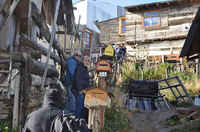Right to housing in Argentina: violations despite State commitment
"I commend the Government’s decision of 2003 to consider housing a responsibility of the State, but I'm very concerned about violent evictions taking place in various regions of the country and the lack of more comprehensive promotion of adequate housing in Argentina, "said UN Special Rapporteur Raquel Rolnik, as she concluded her official mission to the country (13-21 April 2011).
"During my visit, I have received countless testimonies about violent evictions, often undertaken by the State and on public land, without an appropriate alternative offering either relocation or compensation to affected families," said the Special Rapporteur. "The evictions are increasing in both urban and rural areas and affect in particular the residents of informal settlements, as well as peasants and indigenous peoples," added the Special Rapporteur.
Ms. Rolnik said that due to insufficient formal supply of affordable housing “informal occupation of land has been the predominant form of access to housing in the country" and that "currently in various regions of Argentina there is a growing phenomenon of criminalization of people who occupy lands or buildings, and who are victims of growing stigmatization. “I have observed the multiplication and overcrowding of informal settlements in response to the existing imbalance between supply and demand of urban land and affordable housing," said the Special Rapporteur.
"Despite the significant budgetary commitment adopted by the Government since 2003 in response to the housing crisis, and the participation of provinces and municipalities in this effort, the imbalance between supply and demand has continued to increase” noted the Special Rapporteur. “This is partly due to State neglect of housing issues in previous decades. But the situation has deteriorated recently due to the economic growth that Argentina is experiencing and its direct effect on price increases for land, including urban land, housing and rents which have grown proportionately more than the income of most of the population", said Rolnik. "While the concentration of State efforts in delivering housing has been successful both in assisting economic recovery and expansion of housing supply, the housing crisis requires a more diversified policy to address the different housing needs taking into account the self-organizing capacity of informal settlers and cooperatives, "said the Special Rapporteur.
Ms. Rolnik also noted the lack of a structured federal system that really translates in its design, management and implementation the right to adequate housing as set out in international law, and that articulates municipal, provincial and national authorities to improve the implementation and execution of housing policies. In this regard, the Special Rapporteur noted with concern the weakness of the allocation system of the social housing programs, which opens the door to discrimination, and to the conversion of the issue in the object of political disputes.
"I believe that the improvements achieved in housing at the normative and investment levels, as well as the economic growth in recent years, put Argentina in top condition to mobilize and implement a socio-territorial pact for the implementation of the right to adequate housing for all", concluded the Special Rapporteur.
Check the full end-of-mission statement by the Special Rapporteur
Place à laquelle s'applique cet article
Commentaires
%login_link_starAuthentifiez vous ou créez un nouveau compte utilisateur pour commenter.



